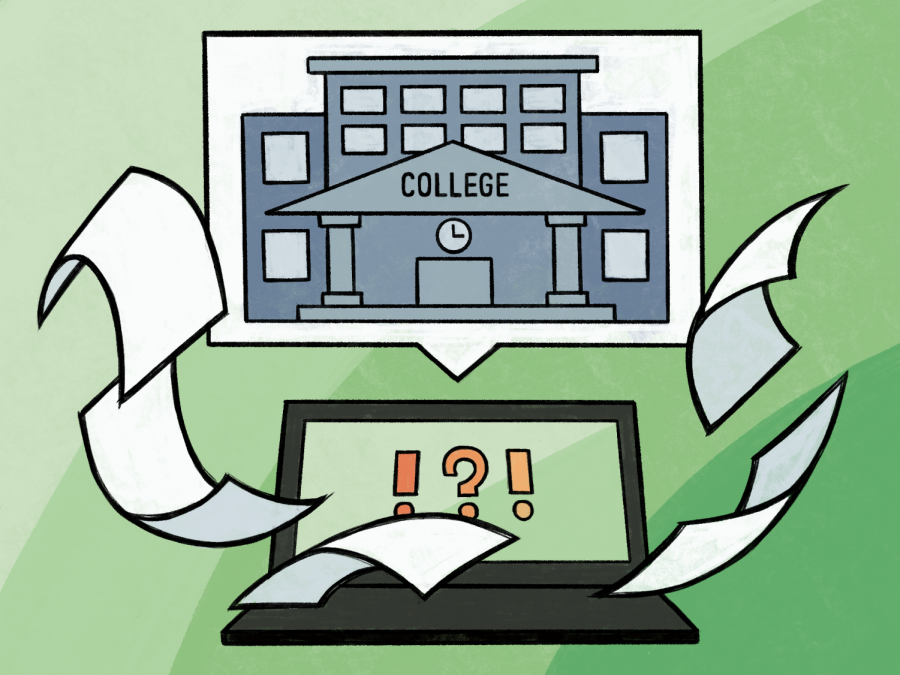CAMPUS: Class of 2022 reflects on their college application experience
The class of 2022 had a unique application experience as many were unable to visit college campuses due to the pandemic.
In the midst of college application season, some SCHS seniors have reflected on applying after experiencing part of their high school career online. For many high school students, the conversation about college initiates during their junior year.
One of the challenges senior Riya Mehta faced was not thinking enough about college during her junior year due to distance learning.
“It had really snuck up on me because we were online our junior year,” Mehta said.
Like Mehta, senior Maia Kumar did not begin thinking about college until the end of junior year.
“I didn’t think about college at all during junior year actually. I was so focused, and I really enjoyed being at home. I felt like I was more productive,” Kumar said. “Towards the end of junior year, I knew I would be applying to UCs, but I wasn’t sure about private schools.”
According to Mehta, the transition from distance learning to adjusting back on campus in conjunction with applying to colleges left her feeling unprepared for the process. Furthermore, due to many of the COVID-19 restrictions during the 2020-2021 school year, she found it challenging to decide which colleges to apply to.
“I haven’t been able to see a lot of the schools because they have been virtual visits, or I just haven’t been able to visit at all because of COVID restrictions,” Mehta said. “I am blindsided a little bit by the process because I don’t know what school is a best fit for me, so I am applying to a lot of them. I’m applying to a lot because I just don’t know and it is unpredictable.”
For senior Thomas Mathew, not being able to visit college campuses was not an issue. Mathew utilized the extra time during his junior year online to research colleges and plan ahead. Instead of visiting campuses first, he was able to attend virtual tours.
“Even if there wasn’t the whole COVID thing, I probably still wouldn’t have visited the colleges, especially on the East Coast,” Mathew said. “I would’ve applied to them and just did a virtual thing, which was really more available because of COVID. There were a lot of virtual informational sessions, and I attended those.”
Unlike Mathew, Mehta ideally wanted to visit more colleges and universities ahead of time to determine which schools she knew were fit for her.
“Before COVID, I visited New York, and we visited Georgetown, NYU and UPENN. Because I was able to visit them, I was able to determine that I really liked NYU and I really liked UPENN, but I didn’t really like Georgetown,” Mehta said. “If I hadn’t visited, I probably would have still applied to Georgetown, but I know now after visiting the campus that I wouldn’t have wanted to go there anyway.”
Alongside determining which colleges to apply to, another challenge many seniors faced pertained to imposter syndrome and comparing oneself to their peers. This was the case for Kumar, especially with applying to CSU schools, where the application only required a high school transcript.
“I just felt like because I didn’t have a high enough GPA, my stats weren’t good enough. I hadn’t really challenged myself, and I was constantly comparing myself to others, ultimately feeling like I wasn’t good enough because of my GPA,” Kumar said. “You are so much more than a grade, and it is sad that the CSUs focus on that one aspect.”
For many other college applications, however, college essays and personal statements are a prominent aspect of the application. In attempts to help other students with their college application essays, Mehta started the College Essay Club, where their goal is to help students edit and revise their college essays.
“What we do is we put our essays in a pile without names, and then we grab someone’s essay and start editing it,” Mehta said. “Then again, when it comes to getting feedback, if you ask too many people, then there might be too much going on, and then one person says they like something, then another person says they hate it. It can feel like you don’t know what to do, so it is important to go with your gut.”
Despite getting ahead on college applications, Mathew reported second guessing himself with his personal statements weeks before the deadline.
“Obviously, people can feel like what they are writing isn’t what the schools are looking for, and there were times where my personal statements just didn’t feel right,” Mathew said. “We were getting closer and closer to the deadline, and I was changing it. It was very stressful for the first few applications before hitting the submit button.”
As students turned in applications, Mathew reminded himself and other students that although it is common to want to go to more prestigious universities, what is more important is how people utilize their time there.
“For undergraduates, they’re really going to be teaching you the same thing regardless of wherever you go, so it matters how you take advantage of whatever resources the college offers. That’s more important than where exactly you go,” Mathew said. “I think there is a lot of emphasis on prestige, but I don’t think it matters in the long term.”
With college applications coming to a close, Kumar encouraged her peers to prepare themselves for the results of their college applications.
“You are so much more than that one college acceptance, or that rejection,” Kumar said. “You want to mentally and emotionally prepare yourself to accept rejection but not see it as a failure but rather as redirection that there will be opportunities down the line.”


